The country that became a 'micronation capital'
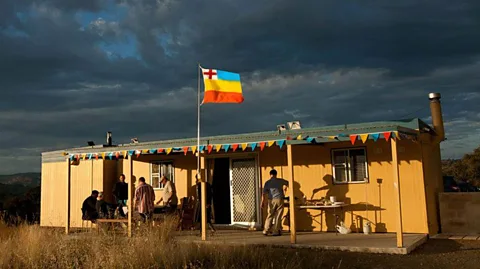 Atlantium
AtlantiumA micronation isn't a real country by definition, yet sometimes these mock states take on a life of their own and come surprisingly close.
In a Sydney suburb in 1981, a teenage George Cruickshank and his two friends painted a border line in his backyard and declared the 10-sq-metre patch the provisional territory of the Empire of Atlantium. After being crowned Emperor George II, Cruickshank issued a unilateral declaration of independence from the Commonwealth of Australia. The trio hoisted a flag and the micronation of Atlantium officially came into being.
Atlantium is one of more than a hundred micronations across the world. A micronation is a self-proclaimed sovereign state that lacks a legal basis for its existence. As a consequence, micronations are not recognised by established nation states, but that does not deter them from assuming the ceremony, pomp and even governance structures of them.
Imitation is not necessarily a form of flattery, however. Micronation founders like Cruickshank seek to challenge the notion of a nation state by proving how artificial a construct they really are.
"The idea of a sovereign nation state having complete authority over its citizens within defined borders is only a fairly recent development, and it led to all of the horrors of the 20th Century," says Cruickshank.
While the interest of Atlantium’s other co-founders eventually waned, Cruickshank became increasingly absorbed by the affairs of his micronation. He issued stamps, minted coins and banknotes, appointed diplomatic representatives and designed a series of flags and insignia. He also adopted a decimal calendar system which divides the year into 10 months.
In 2008, he bought an 80-hectare rural property about 350km (217 miles) from Sydney, which became Atlantium’s administrative capital. The emperor spends most of his weekends at Concordia in the Province of Aurora, where he drafts policy statements and exchanges letters with other micronation leaders and Atlantium’s "unaccredited diplomatic representatives" in the United States, Singapore and Switzerland. Atlantium’s national anthem takes its name from the province. The Auroran Hymn is the excerpt of a soaring symphony by 19th Century composer, Camille Saint Saens.
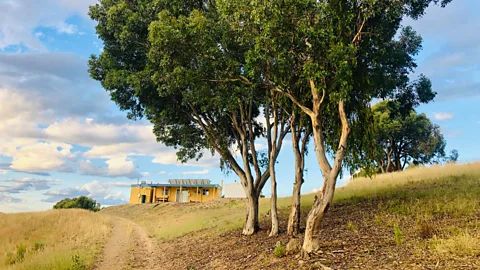 Jessica Mudditt
Jessica MuddittAtlantium supports the right to unrestricted international freedom of movement, so it doesn't issue visas to visitors like myself who come to stay at the capital, which is listed on Airbnb as "the smallest country in Australia".
The off-grid, 0.75-sq-km (0.29-sq-mile) property consists of bushland and a cabin that functions as Government House. An adjoining post office sells currency, stamps and postcards, the latter of which can be slotted into a red post box. A 4m-high (13ft) pyramid flanked by two guardian sphinxes faces the Capitaline Column, which is topped with the national symbol of a wedge-tailed eagle. Near its southern border with Australia, kangaroos nibble at shrubs lining Lake De Hollanda.
Atlantium’s territory is twice the size of the Vatican and its 3,000 "citizens" come from 100 countries, although most have never set foot on it.
Atlantium meets the four criteria of a state as defined by Montevideo Convention of 1933, says Cruickshank. It has a permanent population (if you count its 3,000 remote citizens, that is, otherwise Cruickshank is there every weekend), a defined territory, a government, and the capacity to enter into relations with the other states. To date, though, other nations have been less willing to interact with Atlantium, and it is still some way from ever being recognised as a nation.
"A micronation founder may say that it satisfies the definition in international law of being a state," says Harry Hobbs, a lecturer at the University of Sydney and the co-author of a new book called Micronations and the Search for Sovereignty. "The problem is that it lacks a lawful basis to exercise sovereignty over a territory."
Cruickshank isn’t bothered by the lack of recognition.
"Atlantium isn’t striving for legal recognition as a sovereign state. It is intended to make people question the existence of traditional nation states," says Cruickshank when we meet at Atlantium’s Sydney Representative Office (which is the drawing room of his apartment).
Game of thrones
When Queen Carolyn of Ladonia ascended the throne in 2011, Emperor Cruickshank reached out with a message of congratulations.
"George was quick to extend a hand of friendship and invited me to attend a micronations conference in London," she says.
Ladonia was founded in 1996 following a protracted legal dispute between local authorities in Sweden over a set of sculptures built by the late Lars Vilks. Its first queen had reigned for 14 years when she abruptly ceased performing duties. At the time, Carolyn Shelby was serving as a cabinet minister.
"Ladonia was facing a constitutional crisis because we had no queen, and the queen's heirs did not respond to our attempts to contact them," she explains from her Chicago residence.
With the queen abdicating in absentia, elections were held to find a new one. Ladonia’s constitution stipulates that it will never be ruled by a king.
"Historically, women have gotten the short end of the stick when it comes to being rulers, so Ladonia’s founders wanted to reverse that trend," says Queen Carolyn. "It was also thought that ensuring the throne is occupied by a woman serves as a peaceful and stabilising force for the monarchy."
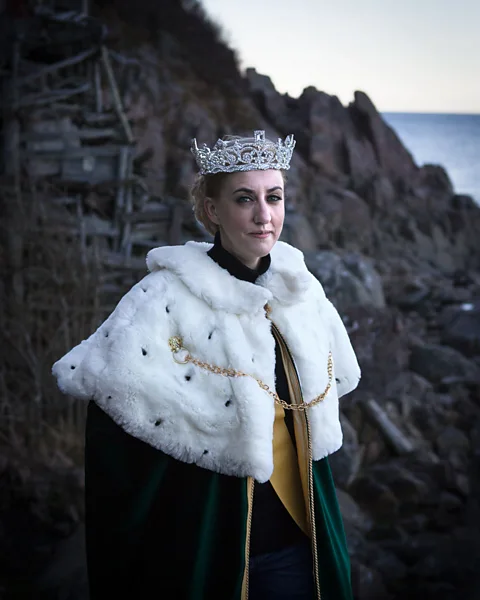 Jonatan Jacobson
Jonatan JacobsonQueen Carolyn travelled to the micronation’s remote capital of Nimis in Sweden for the coronation ceremony. Nimis is a series of wooden sculptures in a nature reserve which is only accessible by foot, covering an area of just 1 sq km (0.39 sq miles). Nonetheless, thousands of people make the pilgrimage every year.
Queen Carolyn's 26-year-old daughter, Crown Princess Greta, lives in Montreal and is next in line for the throne.
"I became queen when she was 16 and at the time she thought it was stupid, but it's growing on her. She has attended a couple of state events on my behalf."
Blurred lines
Ladonia currently has 27,000 registered citizens, the bulk of whom are from Sweden, the United States and Russia. Its citizenship application page underscores that the citizenship certificate cannot be used for travel or to gain work rights. It is "a gesture of support for the freedom of expression and the arts, the ideals which are the foundations of this micronation".
"People love Ladonia because it is a system of government that they chose," says Queen Ladonia. "It's not an accident of birth. We share a vision for the world that we want to build together."
Discussions are regularly held about buying land for Ladonia’s citizens to live on.
"It’s a question of money. Land near Ladonia is inordinately expensive. Our citizens want us to buy land in Spain or Italy. But we must buy land in a country that isn't going to swoop in and crush us."
Part of her role is ensuring that Ladonia's community doesn’t provoke the ire of authorities and threaten its very existence.
"We're poking fun at existing structures. If you take yourself too seriously, you start attracting negative attention from larger nations. No one wants separatists on their borders," she says.
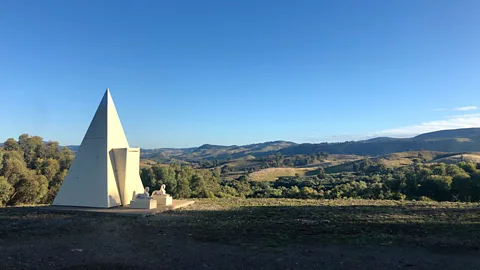 Jessica Mudditt
Jessica MuddittCruickshank has watched in dismay as some micronation founders take things too far. The Principality of Hutt River in Western Australia came into being in 1970 when Leonard Casley attempted to secede from Australia over a dispute over wheat production quotas. In 1977, Prince Leonard, as he came to be known, briefly declared war when he learned he was being pursued for unpaid tax debts.
Hutt River earned the title of the world’s longest-running micronation, but it ultimately wound up with a $3m-Australian-dollar (£1.7m/US$2.2m) tax bill. Calsey abdicated in favour of his son in 2017, and in 2020 he was forced to sell the property and dissolve the once successful tourist site to repay the debt.
"Prince Leonard was a canny guy, but he also had some strange ideas. He gave me some documents with numerological calculations and strange cabbalistic references that were basically designed to show that he's some sort of special person," says Cruickshank.
A similar misfortune befell Peter Fitzek, who contests the legitimacy of the German state and founded a micronation near Berlin called the Kingdom of Germany in 2013.
Like Calsey, ego seemed to get the better of Fitzek. "It's fairly clear that this guy believes his own publicity," says Cruickshank. "When you get into that sort of territory – when you're drinking your own Kool Aid – it gets a bit dangerous."
In 2017, Fitzek was sentenced to almost four years in prison for operating a bank without a license and embezzlement.
"The micronations who run into the most trouble are those which act as though they are in competition with another state," says the University of Sydney’s Harry Hobbs. "States don't want to give up jurisdiction over territory they perceive as theirs, or that they might want in the future."
Blurred lines
The line between fantasy and reality often becomes hazy. Queen Carolyn used to work in an IT role at the Chicago Tribune, where an editor playfully instructed her interns to stand when the "Queen" entered the room, and never to turn their backs on her.
"One day I walked into the newsroom and an intern stood up and was trying to get others to stand up too. Another time she brought something in my office: she handed it to me and then sort of bowed and backed out."
Up until then, Queen Carolyn had been unaware of what the editor had been telling people about her. She found the exchange with the intern amusing.
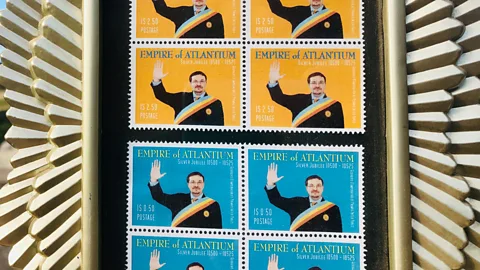 Jessica Mudditt
Jessica MuddittCruickshank describes Atlantium as a "sustained performance art project".
"I’m smart enough to know that I’m not an actual monarch with real power," he says. "But the more people that accept something as a fact, the more real it becomes. People treat me with deference at official events and I get letters addressing me as 'Your Imperial Majesty'. I can't be flippant in response."
There is also the potential for tragic misunderstandings, says Hobbs.
"There have been cases where people who are escaping desperate situations pay a fee to become a citizen, and then the micronation has to tell them it isn’t a real country. And the person says, 'What kind of a joke is this?' This is where it cuts into real life."
'The original nation'
Australia has been dubbed "the micronation capital of the world" because it has more than a dozen micronations. Some are playful, like Atlantium, while others were formed with a specific goal in mind. The Gay and Lesbian Kingdom of the Coral Sea Islands was formed in 2004 in response to the Australian government’s refusal to recognise same-sex marriages. It gained significant media attention and was dissolved in 2017 when Australians voted in support of legalising gay marriage.
Hobbs regards the micronationalism as consistent with Australian culture, which "celebrates mocking authority".
"Australia's pretty secure in its sovereignty. It's a continent with a sparse population. The government sort of says, 'We don't really care, so long as you keep paying taxes and follow the road rules. '"
The Yidindji Tribal Nation is seeking a treaty with Australia's government and to rectify Australia's constitution making no mention of indigenous people. It has 200 citizens, over half of whom are indigenous. The land claimed lies in the state of Queensland and stretches 80 km (50 miles) out to sea.
"The aim of the treaty is to settle the past," says Murrumu Walubara Yidindji, who was speaking in his capacity as minister for foreign affairs and trade. "We're saying, 'Look, you don't have to steal our stuff anymore. We'll settle the past and secure the future. '"
In 2014, the former press gallery journalist changed his name, surrendered his Australian passport and tore up his bank accounts, superannuation and healthcare documents. Members of the Yidinjyi government hand-delivered their treaty to the Australian government in 2017 – however Walubara is still awaiting a reply.
"The Australian government is very slow," he says. "While they catch up with us, we will continue to develop ourselves as a nation. We own the place, and we're not insecure about it."
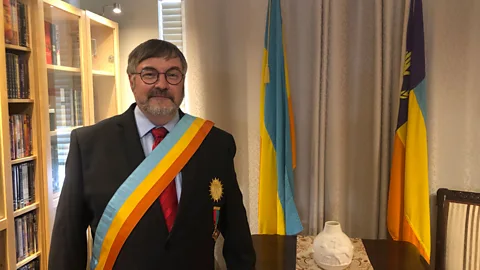 Jessica Mudditt
Jessica MuddittMurrumu emphasises that Yidinjyi is not a micronation but "the original nation".
Hobbs agrees, saying, "I don't call it a micronation because there is a legitimate basis for their claim to sovereignty. Indigenous peoples have been on this land for 60,000 years."
Measuring success
No micronation has ever succeeded in becoming a country – but that doesn’t mean that they necessarily fail. Success depends on what a micronation set out to achieve.
The Free and Independent Republic of Frestonia was formed in west London in 1979 after the Greater London Council threatened 120 residents with formal eviction. Many had moved into the empty houses on Freston Road as squatters.
Frestonia had its own newspaper and Frestonian postage stamps were honoured by the postal service. The shadow chancellor of the exchequer, Sir Geoffrey Howe, published a letter of support. Frestonia even won a legal dispute over its claim not to be part of the UK for the purposes of a film screening. It succeeded in shielding the area from development and existed until 1983.
"It caused a political upheaval that forced the government to change its plans," says Hobbs.
Meanwhile, the Kingdom of Elgaland and Vargaland claims sovereignty over the areas between the borders of countries around the world. "It makes you think about the border regions rather than the territory itself," says Hobbs.
Even more left-of-centre is the Ambulatory Free States of Obsidia, which is a two-pound Obsidian rock carried around in an official state briefcase by its founder, Grand Marshal Yagjian. Formed in 2015, the micronation claims to be "located at the confluence of feminism and geography".
"The future of micronations is gloomy if the aim is to create a state, because that never works," says Hobbs. "However, the community aspect is bright. There will always be people who enjoy creating a community of like-minded individuals and engaging in diplomatic practices. There is the fun of designing a flag, creating a national anthem, and dressing up as a king, queen or emperor and signing non-aggression pacts."
--
